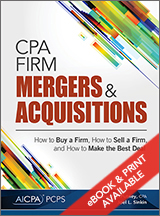Firm Management
Book Offers Advice on When to Buy, Sell or Merge an Accounting Practice
The merger wave among CPA firms is expected to continue its strong pace in 2014, particularly among small to midsized regional firms, according to the authors of a new American Institute of CPAs-published book on acquisition strategies.
Jan. 14, 2014

The merger wave among CPA firms is expected to continue its strong pace in 2014, particularly among small to midsized regional firms, according to the authors of a new American Institute of CPAs-published book on acquisition strategies.
Drivers for this trend include succession planning, cross-selling opportunities and market share expansion, say Joel L. Sinkin and Terrence E. Putney, CPA, co-authors of “CPA Firm Mergers & Acquisitions: How to Buy a Firm, How to Sell a Firm, and How to Make the Best Deal.”
Another overlooked factor: the search for talent, they say. Unemployment remains low in the accounting profession, and many smaller firms find themselves in an increasingly competitive market for the next generation of leaders. As recruiting battles heat up, buying or selling a firm makes sense as a growth strategy or exit plan.
“Smart firms plan ahead,” Sinkin said. “We still see too many firms not preparing for transition, and those that wait too long may have problems finding the right fit.”
Sinkin and Putney are president and CEO, respectively, of Transition Advisors LLC, and have worked on hundreds of deal closings. In their book, they outline how firm leaders can determine the value of their practice when selling externally or to partners, avoid roadblocks in negotiation, exercise due diligence and strike a deal that offers the best value and deal structure for all parties. They also offer insight into retaining staff and clients during a transition.
The book also discusses ways to build a firm’s value before it’s time to make a deal, such as:
- Accurately assessing internal succession plans
- Matching a firm’s client base to its strengths
- Investing in technology, which can be a great tool to attract younger workers and enable more flexible work arrangements
- Developing specialty practices or niche service areas, which can be one of the most effective ways to protect firm value
